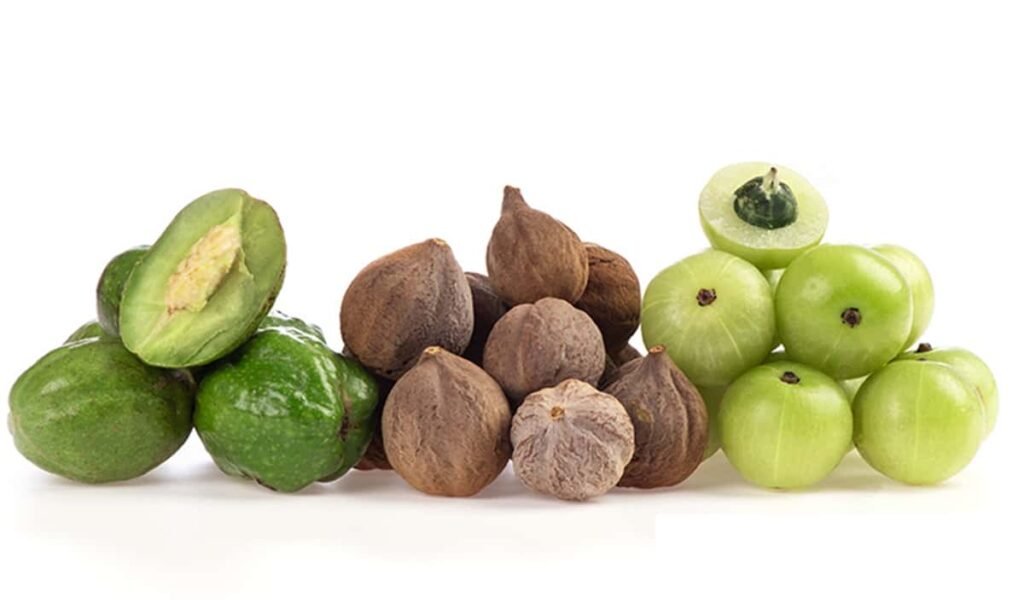The benefits of Triphala, a cornerstone of Ayurvedic medicine for thousands of years, are more than just a trendy supplement; it’s a potent polyherbal formulation with a wide array of health benefits. Derived from the Sanskrit words “Tri” (three) and “Phala” (fruits), it comprises the dried fruits of Amalaki (Emblica officinalis), Bibhitaki (Terminalia bellirica), and Haritaki (Terminalia chebula). This synergistic combination works in harmony to promote overall health and well-being.
While modern science is increasingly validating its traditional uses, Triphala remains a testament to the wisdom of ancient healing practices. This blog post delves into the top 21 important benefits of Triphala, offering a comprehensive overview of its potential to enhance your health.
Understanding the Triphala Trifecta: The Power of Three
Before diving into the benefits, let’s briefly understand the individual contributions of each fruit in the Triphala formulation:

- Amalaki (Emblica officinalis): Also known as Indian Gooseberry, Amalaki is revered for its rich vitamin C content and potent antioxidant properties. It’s believed to nourish tissues, support the immune system, and promote longevity.
- Bibhitaki (Terminalia bellirica): Bibhitaki is known for its detoxifying and rejuvenating qualities. It’s thought to support respiratory health, aid in digestion, and contribute to the healthy function of the liver.
- Haritaki (Terminalia chebula): Considered the “king of medicines” in Ayurveda, Haritaki is lauded for its cleansing and balancing properties. It’s believed to promote healthy digestion, improve cognitive function, and support a healthy inflammatory response.
This carefully balanced blend is what makes Triphala so effective. The individual fruits complement each other, enhancing their individual benefits and creating a synergistic effect greater than the sum of their parts.
Top 21 Important Benefits of Triphala:
- Supports Healthy Digestion: This is perhaps the most well-known benefit of Triphala. Its gentle cleansing action helps regulate bowel movements, alleviate constipation, and promote a healthy gut microbiome. It works as a mild laxative without causing dependence, unlike some harsher alternatives. It supports regular elimination, helping to clear the digestive tract of accumulated waste.
- Detoxifies the Body: Triphala aids in detoxification by supporting the elimination of toxins through the digestive system. It gently cleanses the colon and promotes healthy liver function, both crucial organs involved in the body’s natural detoxification processes. This detoxification can lead to increased energy levels and a greater sense of well-being.
- Improves Nutrient Absorption: A healthy digestive system is essential for optimal nutrient absorption. By improving gut health and reducing inflammation in the digestive tract, Triphala can help your body absorb nutrients more efficiently from the food you eat. This can lead to improved overall health and vitality.
- Rich in Antioxidants: Triphala is packed with potent antioxidants, including vitamin C, flavonoids, polyphenols, and tannins. These antioxidants help neutralize free radicals, which are unstable molecules that can damage cells and contribute to aging and chronic diseases. This antioxidant activity supports cellular health and protects against oxidative stress.
- Boosts Immunity: The combination of antioxidant properties, digestive support, and its influence on gut health contributes to Triphala’s ability to boost the immune system. A healthy gut microbiome is essential for a strong immune response, and Triphala helps to maintain a balanced and thriving gut ecosystem.
- Supports Healthy Weight Management: While not a magic bullet for weight loss, Triphala can be a valuable tool in a comprehensive weight management strategy. Its digestive benefits can help improve metabolism and reduce bloating, while its antioxidant properties may contribute to a healthier body composition. Some studies suggest it may also help regulate appetite and reduce cravings.
- Promotes Oral Health: Triphala possesses antibacterial and anti-inflammatory properties that can benefit oral health. It can be used as a mouthwash to reduce plaque buildup, fight gum disease, and freshen breath. Its astringent properties can also help tighten gum tissues.
- Supports Healthy Vision: Amalaki, one of the key ingredients in Triphala, is particularly beneficial for eye health. Its high vitamin C content and antioxidant properties can help protect against age-related macular degeneration and cataracts. Some studies suggest it may also improve visual acuity.
- May Reduce Inflammation: Chronic inflammation is linked to a wide range of health problems, from heart disease to arthritis. Triphala has demonstrated anti-inflammatory properties in several studies, potentially reducing inflammation throughout the body. This is attributed to the combined action of its constituent fruits and their potent antioxidant compounds.
- Supports Healthy Skin: Triphala’s antioxidant and anti-inflammatory properties can also benefit the skin. It may help reduce inflammation associated with skin conditions like acne and eczema, promote wound healing, and protect against sun damage. It can also contribute to a brighter and more even complexion.
- May Improve Cardiovascular Health: Some research suggests that Triphala may help lower cholesterol levels and blood pressure, both important risk factors for heart disease. Its antioxidant properties also protect against oxidative damage to blood vessels, further supporting cardiovascular health.
- Supports Healthy Respiratory Function: Bibhitaki, one of the fruits in Triphala, is traditionally used to support respiratory health. It may help soothe irritated airways, reduce coughs, and alleviate symptoms of respiratory infections.
- May Improve Cognitive Function: Haritaki, considered the “king of medicines,” is traditionally used to improve cognitive function and memory. Its antioxidant properties can protect brain cells from damage, and it may also enhance blood flow to the brain.
- Balances the Three Doshas: In Ayurveda, the three doshas – Vata, Pitta, and Kapha – represent fundamental energies that govern our health and well-being. Triphala is considered a Tridoshic Rasayana, meaning it helps balance all three doshas. This balanced state is believed to promote optimal health and prevent disease.
- Supports Liver Health: Triphala helps to detoxify the liver and promote its healthy function. A healthy liver is essential for filtering toxins from the blood, producing bile, and metabolizing nutrients.
- May Reduce Stress and Anxiety: While more research is needed, some studies suggest that Triphala may have a calming effect on the nervous system, helping to reduce stress and anxiety. Its antioxidant properties may also protect against the damaging effects of stress on the body.
- Supports Healthy Blood Sugar Levels: Some studies indicate that Triphala may help regulate blood sugar levels, which is beneficial for individuals with diabetes or pre-diabetes. It’s important to note that Triphala should not be used as a replacement for conventional diabetes treatment.
- Promotes Longevity and Rejuvenation: In Ayurveda, Triphala is considered a Rasayana, which is a substance that promotes longevity, vitality, and overall well-being. Its antioxidant properties, digestive support, and ability to balance the doshas all contribute to its rejuvenating effects.
- Gentle and Safe for Long-Term Use: Unlike some harsher laxatives or detoxifying agents, Triphala is generally considered safe for long-term use when taken in appropriate dosages. However, it’s always best to consult with a healthcare professional before starting any new supplement regimen.
- Easy to Incorporate into Your Routine: Triphala is available in various forms, including capsules, tablets, powders, and liquid extracts. This makes it easy to incorporate into your daily routine, whether you prefer to take it as a supplement or use it as a mouthwash.
- Affordable and Accessible: Triphala is generally an affordable and accessible supplement, making it a cost-effective way to support your overall health and well-being.
How to Use Triphala:
The appropriate dosage of Triphala varies depending on the individual and the form being used. It’s generally recommended to start with a low dose and gradually increase it as needed. Common dosages include:
- Powder: 1/2 to 1 teaspoon mixed with warm water before bed or in the morning.
- Capsules/Tablets: Follow the dosage instructions on the product label.
It’s best to take Triphala on an empty stomach for optimal absorption.
Important Considerations and Potential Side Effects:
While Triphala is generally safe, it’s important to be aware of potential side effects, which are usually mild and temporary. These may include:
- Diarrhea or loose stools: This is more common when starting Triphala.
- Gas and bloating: This may occur due to the increased fiber content.
- Dehydration: It’s important to drink plenty of water when taking Triphala.
Consult with a healthcare professional before using Triphala if you:
- Are pregnant or breastfeeding
- Have a pre-existing medical condition
- Are taking any medications
Conclusion:
Triphala, with its rich history and impressive array of health benefits, is a powerful tool for supporting overall well-being. From promoting healthy digestion and detoxification to boosting immunity and protecting against oxidative stress, Triphala offers a holistic approach to health. By understanding its unique properties and incorporating it responsibly into your routine, you can harness the potential of this time-tested Ayurvedic remedy to enhance your health and vitality. Remember to consult with a healthcare professional before starting any new supplement regimen.


